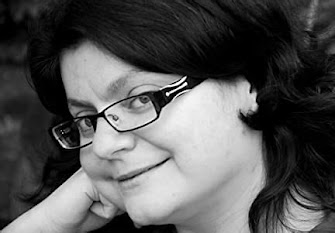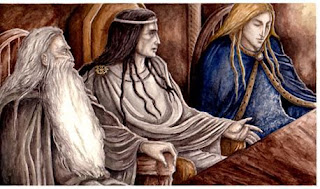Eglerio! This year The Centre for Fantasy and the Fantastic, School of Critical Studies, University of Glasgow will again be sponsoring six Tolkien sessions at The International Medieval Congress at The University of Leeds from 1st to 4th July . This continues the tradition started by our founder Professor Dimitra Fimi (whose vision and scholarship we are celebrating this summer!) and is my fourth year organising these sessions.
We have a great line up of Tolkien scholars and students exploring many aspects of Tolkien and Middle-earth studies including several papers focused on the timely subject of this year's conference CRISIS
Tolkien Medieval Roots and Modern Branches
This year we have two sessions which address wider topics and new approaches to Tolkien's medievalism and works.
Session 1 - Monday 1st July 2024: 11:115-12:45 GMT
1) "Sir Gawain and the Green Knight" Tolkien's 1953 Lecture and Related Finding: Andoni Cossio, Universidad del País Vasco - Euskal Herriko Unibertsitatea, Vitoria-Gasteiz; University of Glasgow (Virtual)
2) Gondor Calls for Aid: But Who Will Pay? Brian Egede-Pedersen, Independent Scholar
3) Eärendil's Mythopoeic Journeys - Anna Smol, Mount Saint Vincent University, Nova Scotia
Session 2 - Monday 1st July 2024: 14:15-15:45 GMT
1) Sub-Creation, Multi-Canon, or Unreliable Narrator: Mythopoeia in Action - Amira Ali Hassan Ali Abdullah, Independent Scholar
2) 'The king has got a crown again': Ruin as Hyperobject in Arda - Will Sherwood, University of Glasgow
3) Freezing the Frame on Crises in the Legendarium through the lens of Alan Lee - Sultana Raza, Independent Scholar
Tolkien's Medieval Sub-Creation in Crisis
Monday 1st July: 16:30-18:00 GMT
This session will examine different concepts of crisis in Tolkien studies.
1) A Medievalist Myth-Making Crisis: Tolkien's Tychonic Cosmology - Kristine Larsen, Central Connecticut State University
2) Bree-folk were sympathetic, but…': Historical Precursors to Middle-Earth's Migration Crisis at the End of the Third Age - Christian Trenk, Katholische Universität Eichstätt-Ingolstadt
3) The Crisis of Arda Marred and How (Not) to Unmar It: The Ring, the Tongue, and the Tower as the New Wheel of Fortune, the New Tower of Babel, and the New World Tree - Cameron Bourquein, Independent Scholar
Racial Medievalism in Tolkien Studies: A Session Celebrating the Works of Professor Dimitra Fimi, Founder of Tolkien at Leeds
Tuesday 2nd July 2024: 11:15-12:45 GMT
In this session we will celebrate the work and scholarship of our Tolkien at Leeds IMC founder and leading scholar and author of Tolkien and speculative literature Professor Dimitra Fimi whose ground-breaking 2008 book Tolkien, Race and Cultural History: From Fairies to Hobbits, won the Mythopoeic Scholarship Award for Inklings Studies in 2010. Fimi’s evolving body of work has brought to light neglected aspects of Tolkien’s creativity and world-building, including the centrality of the Elves, the role of linguistic invention, and the relationships between race and material culture in Middle-earth
1) Into the West: Wonders and Woes of Looking for 'Celtic' Inspirations in the Works of J. R. R. Tolkien - Aurelie Bremont, Sorbonne Université, Paris
2) Teaching Song and Holiness: An Exploration of the Mystic and Syncretic Elements of Tolkien's Earliest Elvish Language Invention: Andrew Higgins, Independent Scholar
Tolkien at Leeds Business Meeting - 1pm-1:45pm GMT -
To Join via Zoom:
Join Zoom Meeting
https://us04web.zoom.us/j/74677333558?pwd=5TBbknvYUOOb9sZRplpS4t4xOUTuG0.1
Meeting ID: 746 7733 3558
Passcode: 5m92am
Bodily Crises in Tolkien's Medievalism
There will be two sessions exploring crises/concerns of gender and bodily difference in Tolkien’s works including sexuality and disability. Indicative areas to be examined include the role of bodies under physical duress, punishment, injury from battle or war, as well as bodies in transformation including prosthetics, spiritual transformation (good or evil) and how bodies and body transformation from Tolkien’s works are depicted in illustrations and in films and other media.
Session 1 - Weds 3rd July: 14:15-15:45 GMT
1) Altered Bodies, Altered States in the 'Tale of Tinúviel' - Cami Agan, Oklahoma Christian University
2) Éowyn and/or Dernhelm: Tolkien's Paradoxical Gendering of Éowyn's Disguise Gavin Foster, Dalhousie University, Nova Scotia
3) The Torment of Maedhros and a Crisis of Mercy: Bodily Crises in Tolkien's Medievalism - Mercury Natis, Signum University, New Hampshire
Session 2 - Weds 3rd July: 16:30-18:00 GMT
'Restless and uneasy...thin and stretched': The Ring, the Ringbearers, and Bodies in Psychological Crisis in Tolkien's The Lord of the Rings - Sara Brown, Signum University, New Hampshire
Bodily Transformations in Tolkien's Middle-Earth: The Metamorphosis of Elwing - Yvette Kisor, Ramapo College of New Jersey
'He was naked, lying as if in a swoon': Gazing Queerly at Frodo's Saintly Body in Crisis - Christopher Vaccaro, University of Vermont
Crisis in Researching Tolkien: The Annual Tolkien at Leeds Roundtable
Weds 3rd July: 19:00-20:00 GMT
We will end the 2024 Tolkien at Leeds Session with the annual roundtable - this year in response to the conferences overall theme a panel of Tolkien scholars will explore the current crises facing Tolkien teachers, academics, and researchers in Tolkien and Middle-earth studies.
As always SODOM (The Society for the Drinking of Mead) Events and Fellowship throughout!
On Saturday 6th July The Tolkien Society will be presenting Tolkien Society Hybrid Seminar 2024 – Tolkien’s Romantic Resonances at the Hilton Leeds City
See you in Leeds this July!







